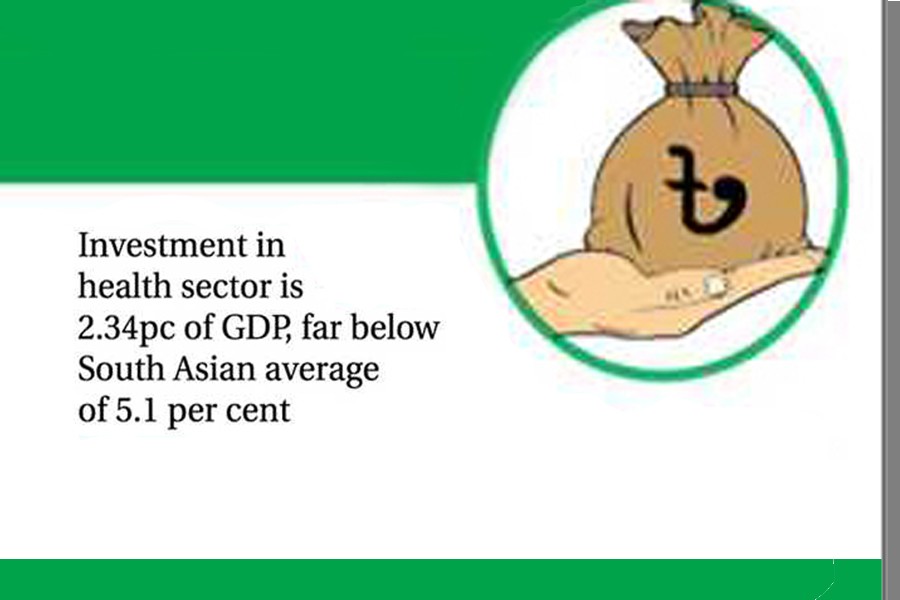Experts on Saturday called on the government to raise the budgetary allocation for primary healthcare in a bid to cover the majority population in the country.
Sustained investment in primary health services would help reduce the burden on secondary and tertiary healthcare, thereby requiring less budget, in the long run, they noted.
They also urged the authorities concerned to increase the workforce in the health sector, carry out researches to stem the outbreak of diseases, pilot universal health coverage, and check irregularities in the sector.
The recommendations came at a webinar on 'Government expenditure in the health sector: Proposals for FY 2021-2022' jointly organised by the Bangladesh Health Watch (BHW) and the Unnayan Shamannay (UnSy).
Planning Minister MA Mannan was present as the chief guest while UnSy Chairperson Dr Atiur Rahman presented the keynote paper at the event moderated by BHW Convener Mushtaq Haque Chowdhury.
Former health minister AFM Ruhal Haque, members of parliament Prof Dr Md Habibe Millat, Shirin Akter and Aroma Dutta, Gonoshasthaya Kendra (GK) founder Dr Zafrullah Chowdhury, and general secretary of Bangladesh Mahila Parishad Maleka Begum also spoke.
In his keynote paper, Dr Atiur, also a former governor of Bangladesh Bank, said investment in the health sector from both public and private sources is 2.34 per cent of the country's GDP, which is far below the average in South Asia (5.1 per cent).
Besides, per capita health expenditure in the country is about US$ 110 while the average in South Asia is over $ 401, he added.
Despite a 5.0 per cent annual increase in the health budget during the past decade, about 61 per cent of the budget allocation in the sector was spent on operational purposes like salaries, medicine, utilities etc, he pointed out.
Dr Atiur suggested that the government must increase budgetary allocation for primary healthcare to 30 to 35 per cent of the total health budget from the existing 25 per cent.
If the community clinics function well at the union level, patient load at hospitals in upazila, district and big cities will start diminishing, he said.
He proposed forming a health commission that would ensure accountability and transparency in government expenditure in order to check irregularities in the sector.
The former Bangladesh Bank governor also said the government should earmark 7.0 to 8.0 per cent of its national budget for the health sector, which should be increased to 10 to 13 per cent in the 8th Five-Year Plan.
Planning minister MA Mannan said, "It is an established perception that the allocation for the health sector is inadequate, but at the same time the limitations of the country should also be acknowledged."
Stating that the budget allocation for the health sector should follow bottom-to-top approach, he added: "In my sense, primary healthcare should get 50 to 60 per cent of total health budget because most of the service recipients of primary health centres reside in rural areas-home to about 70 per cent of the country's population."
Criticising the practice of spending the budget at the end of a financial year, Mr Mannan said such tendency must be stopped, as it is a major barrier to ensuring quality of development projects.
Terming universal health coverage a demand of the age, he said the government has been working on the issue to pilot the idea in a few upazilas at first.
Former health minister Ruhal Haque said over 5,066 posts (from grade 9 and above) have been empty in 34 government medical colleges and four medical universities.
He also pointed out that the patient load per doctor in Bangladesh is one of the highest in the world. Under such circumstances it is not possible to ensure quality healthcare at all levels unless more health professionals are recruited, he added.
Mr Haque recommended introducing a separate cadre for health services as the current structure has been creating discrimination among health professionals.
Dr Millat said Bangladesh has only about 30,000 doctors, but the country needs over 100,000 doctors based on its population size.
Not just doctors, there is also an acute shortage of nursing staff, he added.
He also said it is true that the pandemic has exposed the weaknesses of the health sector, but coronavirus is not the only challenge the health sector has been facing.
For example, he said the number of preventable deaths from various diseases in the country in the last two months is higher than the deaths due to Covid-19 in the last one year.
So, the issues in the health sector need to be dealt with a holistic approach, the parliamentarian added.


